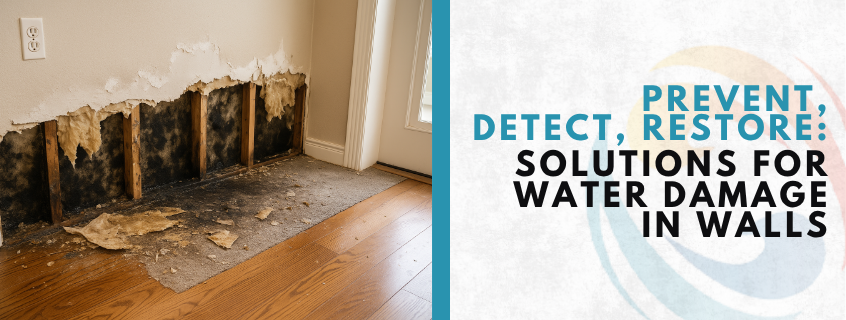Water issues inside your home often begin quietly, slowly causing deterioration long before the signs become visible. Hidden moisture can lead to structural weakening, mold growth, and costly repairs, especially for homeowners in places like Venice, where coastal humidity increases the risks. When water damage in walls develops over time, the effects can spread into ceilings, insulation, and flooring. Recognizing early indicators and understanding why these problems develop helps protect your home from long-term, expensive consequences.
Key Causes and Warning Signs of Water Damage
Understanding the common causes and early warning signs of water damage helps homeowners act quickly, preventing costly repairs and mold growth.
1. Common Causes
- Leaking pipes hidden behind walls
- Failing roof materials letting moisture in
- Poorly sealed windows allowing Venice rain to enter
- Appliance malfunctions dripping into wall cavities
- HVAC condensation accumulating silently
2. Warning Signs to Watch For
- Stains in shades of brown or yellow
- Wallpaper peeling or bubbling
- Musty odors signaling mold
- Rising water bills suggesting a hidden leak
- Warped or soft drywall indicating deeper issues
3. Why These Signs Matter
Understanding these early indicators helps prevent widespread damage. Moisture that goes unnoticed can lead to bigger issues like drywall water damage or structural decline. Homes in humid coastal areas such as Venice are more vulnerable because moisture lingers longer, slipping behind wall surfaces and creating hidden deterioration that spreads quickly.
How Water Travels Through Walls
Water doesn’t stay in one place once it enters your home. It can seep downward from a roof leak, sideways from a damaged pipe, or upward through ground-level moisture. This movement creates a chain reaction inside wall cavities, affecting framing, insulation, and your indoor air quality. When water damage in walls becomes severe, mold begins to form in dark, closed-off spaces. This is especially common in coastal homes like those in Venice where elevated humidity accelerates moisture retention. Water can also travel from ceilings into wall structures, spreading further into adjacent rooms. Even small leaks may cause extensive unseen deterioration. Because walls hide the internal framework of your home, damage often goes unnoticed until it has already progressed. Understanding how water moves helps you identify problem areas faster and address them before they become large-scale repairs that require professional intervention.
What to Do When You Suspect Hidden Moisture
If you notice signs of moisture damage inside walls, acting quickly is crucial to minimize structural damage and mold growth.
1. Stop the Source Immediately
Turn off water valves and inspect nearby appliances. Prevent further damage quickly before moisture spreads.
2. Document Everything Carefully
Take pictures of stains, warped areas, and any visible deterioration. Documentation helps with claims and professional assessments.
3. Improve Ventilation
Use fans, open windows, and run dehumidifiers to slow the progression of water saturation behind walls.
4. Call Restoration Experts
Professionals can detect hidden moisture and begin home water damage restoration safely. This is especially important in Venice homes, where humidity complicates drying.
5. Consider Mold Risks
If you smell mustiness, mold may already be growing. Specialists can safely remove contaminated materials to avoid spreading spores.
Preventing Future Wall Damage
Preventive maintenance is the best long-term strategy for avoiding serious water-related issues. Start by inspecting your roof regularly and clearing gutters to ensure proper drainage during heavy rain. Check windows and doors for failing seals, especially if you live in a coastal environment where wind-driven moisture makes homes more vulnerable. Look beneath sinks and around appliances for slow drips that may cause deterioration inside your wall cavities. If damage does occur, contacting a professional Water Damage Restoration Venice can help quickly repair affected areas and prevent further problems.
The next step is improving airflow and humidity control throughout your home. HVAC systems should be inspected yearly to prevent condensation buildup, which often contributes to ceiling and wall leaks. Keep exterior grading sloped away from your foundation so water can’t seep into the lower walls. With consistent maintenance, the risk of water damage in walls decreases significantly, and early issues become easier to detect before major repairs are required.
Key Terms Every Homeowner Should Know
Homeowners should understand key moisture terms to recognize water damage in walls, communicate clearly with experts, and protect their homes.
1. Moisture Intrusion
Any water entering your home through cracks, leaks, or humidity seepage.
2. Structural Compromise
Damage to framing or internal support due to prolonged exposure to moisture.
3. Mold Colonization
Growth of mold in dark, damp wall cavities where air circulation is minimal.
4. Drywall Saturation
Occurs when drywall absorbs moisture, leading to softening, warping, or collapse.
5. Hidden Leak Migration
How water silently spreads through ceilings, floors, and adjoining walls.
6. Humidity Retention
How homes, especially in humid areas like Venice, trap moisture inside building materials.
FAQs: Spotting and Handling Hidden Moisture
How long does it take for water to cause wall damage?
It can begin within 24 to 48 hours depending on the leak’s severity. Hidden leaks may take weeks to show signs.
Can walls dry on their own?
No. Moisture trapped inside walls often stays there, eventually causing mold and deeper deterioration.
Is mold always visible?
Not always. Mold can grow behind walls long before discoloration appears on the surface.
Should drywall always be replaced after damage?
If it has absorbed water or weakened structurally, replacement is usually necessary.
Does insurance cover water damage?
Sudden accidental leaks may be covered, while gradual issues typically are not.



